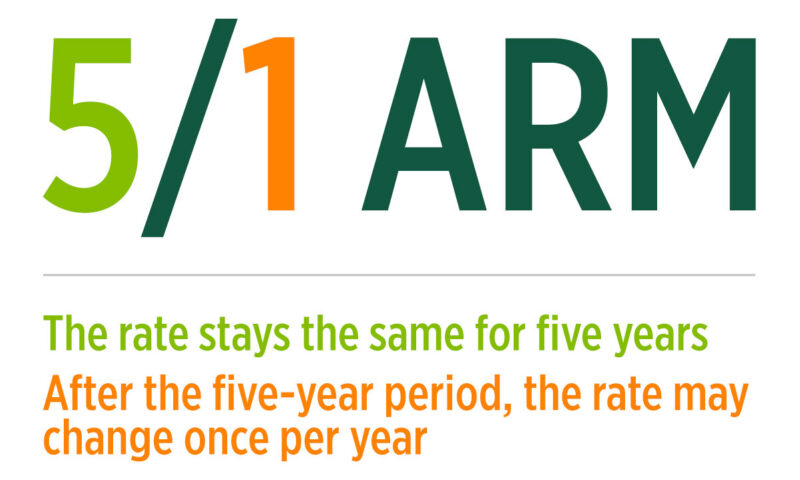Article Excerpt
Find out what an adjustable-rate mortgage is, and how they work. How much can they increase by? Is it a good idea to get one? How should you decide?
Adjustable-rate mortgage (ARM) definition: a home loan with an interest rate that may increase or decrease every so often. Your other option would be a fixed-rate mortgage (FRM). Fixed rates don’t ever change through the life of the loan. By choosing an ARM, you’re taking on some of the risk that lenders have when they give you a fixed rate. So naturally, an ARM’s rate is lower than a fixed.
After the financial crisis of 2008, adjustable-rate mortgages got a bad reputation. Homebuyers were drawn in by super low rates (too low, in fact), and then were unable to afford their mortgage payments when their rates adjusted. But now, new rules put in place by the Consumer Financial Protection Bureau help prevent these situations from happening again. This is just one more reason why you should truly trust your lender as having your best interests in mind.
By learning about how ARMs work and teaming up with a trusted lender, you can make a smart decision.
How does an ARM loan work?
Just like a fixed-rate loan, you’ll go through the mortgage application process, choose a loan program, lock a rate, and go to the closing table.
Even with an ARM, there’s an initial period of time where your interest rate won’t move. A 5/1 ARM’s fixed-period would hold your interest rate for the first five years. After the fixed period, your lender has the ability to adjust your interest rate. Although a 5/1 is the most common, the fixed period can last from three to ten years.

How much could an ARM’s rate increase by?
The rate cap structure tells you how much your rate can increase by. Freddie Mac explains it best:
- “A 7/1 ARM with a 5/2/5 cap structure means that for the first seven years the rate is unchanged, but on the eighth year your rate can increase by a maximum of 5 percentage points (the first ‘5’) above the initial interest rate.
- Every year thereafter, your rate can adjust a maximum of 2 percentage points (the second number, ‘2’)
- Your interest rate can never increase more than 5 percentage points (the last number, ‘5’) over the life of the loan.”
How much your ARM will fluctuate by will be tied to an index and a margin. The one-year CMT, the London Interbank Offered Rate (LIBOR), and Cost of Funds Index (COFI) are some of the major mortgage indexes that may determine your rate.
Prepayment penalties
Keep in mind that prepayment penalties are more common with adjustable-rate mortgages. Your lender may charge this penalty if you choose to pay off the loan for any reason - even if you’re refinancing or selling the home. But here at The Wood Group of Fairway, we never charge prepayment penalties for any reason on any loan type.

Adjustable rate vs fixed: which is better?
In what scenario would you consider choosing an adjustable rate over a fixed rate? Here are a few indicators:
- If there’s a large difference between ARM and fixed rates - Sometimes the spread between an ARM and a fixed rate will convince you to go with an ARM.
- If you can pay off the loan before the rate adjusts - For example, if you go with a 5/1 ARM and plan to pay it off within five years. You’d get to take advantage of a low rate while assuming no risk of it increasing.
- If you think rates will go down - Although this is the riskiest reason to choose an ARM, some borrowers hedge their bet on rates falling in the future. And sometimes they win.
See historical differences between adjustable and fixed rates. Download Freddie Mac’s updated sheet.
But if you want 100% predictability and don’t plan to pay off your loan within an ARM’s fixed timeframe, a fixed-rate mortgage is your best bet. Maybe you’ll miss out on some savings by choosing a fixed rate. But you’re taking virtually zero risk in having your monthly payments increase.
Can you refinance an ARM loan?
Yes, you can refinance an adjustable-rate mortgage. In fact, refinancing may be a good option when approaching the end of your ARM’s fixed period. You can even refinance your adjustable rate into a fixed rate. Just remember that refinancing a mortgage comes with closing costs. You should get with a mortgage adviser to help find out if refinancing will save you money.
» READ MORE: What can a refinance do for you?
Should you choose an ARM loan during the COVID pandemic?
Good question! Remember those top three reasons why you’d want an adjustable rate? They apply during the COVID pandemic, too.
Mortgage interest rates are low right now. In fact, we’ve seen the lowest recorded rates in history during this pandemic. It’s very uncertain where rates are headed next - but they’re already low. We’ve even seen fixed rates dip below adjustable rates. So it looks like we’re in more of a fixed-rate environment right now. But if you confidently plan to pay off the ARM within its fixed period, then you may consider going with it.
More mortgage questions?
You’re in the right place. The Wood Group of Fairway welcomes home 200+ Texan families every month. Let’s find out what your best options are. Start on your free pre-approval in just 90 seconds!



